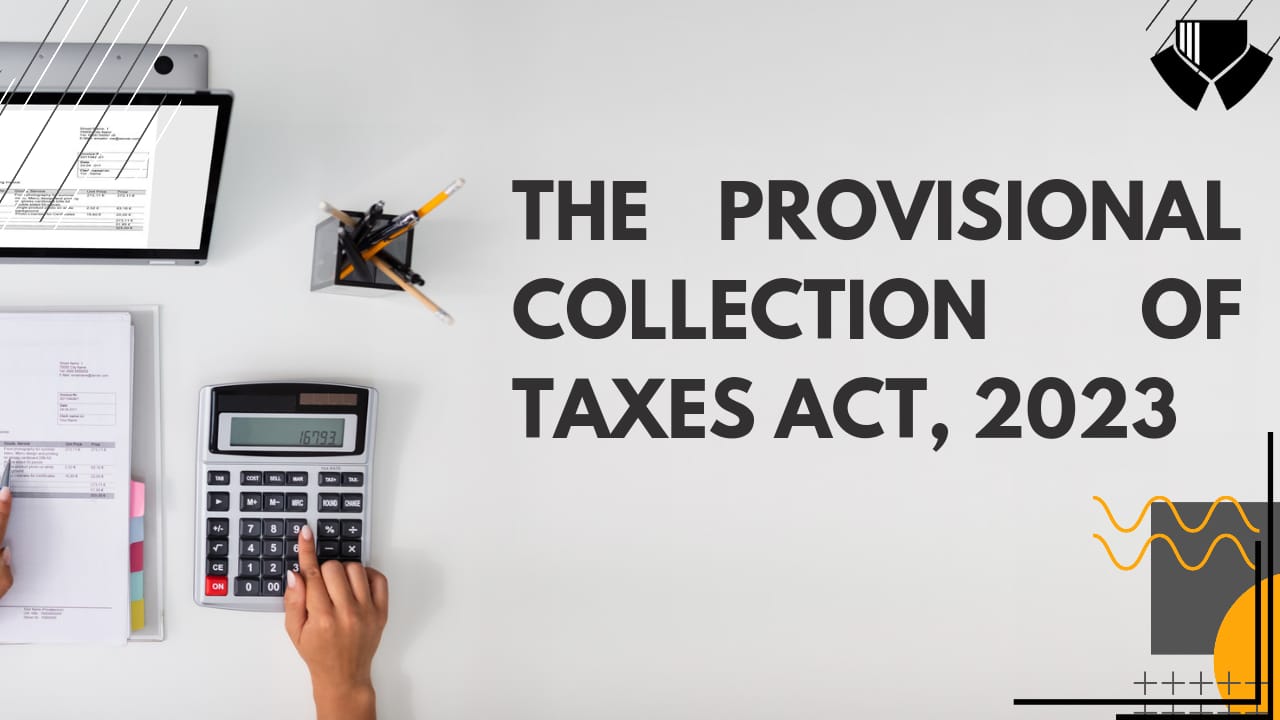This act brief is written by Aryaman Gupta 4th Year BBALLB student IIM Rohtak.
Introduction
The Provisional Collection of Taxes Bill, 2023 was introduced in the Legislative Assembly on December 13, 2023. This bill allows the government to quickly adjust customs or excise duties without waiting for the budget. Unlike income tax, which usually changes during the budget announcement, this bill lets the government raise customs duties immediately through notification.
Additionally, the bill requires the government to refund any taxes collected but not yet approved in the Finance Bill. This process differs from the usual method outlined in the Provisional Collection of Taxes Act, 1931, where certain customs and central excise duties take effect as soon as the Union Budget is presented. This means that any changes to customs and excise duties kick in from midnight on budget day, which is different from how other taxes are handled. In essence, the Provisional Collection of Taxes Bill, 2023 represents a significant shift in tax policy, streamlining the process for immediate duty adjustments while ensuring transparency and accountability in tax collection.
History of the Bill
The Provisional Collection of Taxes Bill, 2023 was introduced in Lok Sabha on December 13, 2023, by Finance Minister Nirmala Sitharaman. Its aim was to update how taxes are collected by replacing the old Provisional Collection of Taxes Act from 1931. After discussions and approval in both houses of parliament, the President signed it into law on December 28, 2023.
While the new bill mostly keeps the same rules as the 1931 Act, it brings some changes to make tax collection smoother and more efficient for today’s needs.
It’s interesting to note that before the 1931 Act, there was a similar law called the Provisional Collection of Taxes Act from 1918. This older law allowed for immediate changes in tax rates, not just increases but also decreases, showing how tax laws have evolved over time to adapt to changing circumstances.
So, the Provisional Collection of Taxes Bill, 2023 carries on the tradition of adjusting taxes quickly when needed, but with some modern tweaks to make it work better for our current economy and government.
Objective of the Act
The Provisional Collection of Taxes Bill, 2023 aims to make certain tax changes happen right away, but only for a short time. These changes mostly relate to customs or excise duties, which are taxes on goods coming into or going out of the country. The bill also gets rid of the old Provisional Collection of Taxes Act from 1931.
Finance Minister Nirmala Sitharaman explained that the bill is about getting permission from Parliament to collect these new taxes for a temporary period, which is 75 days.
Usually, when the government changes income or corporate tax rates, those changes start from April 1st or a day the government tells everyone about. But with customs and excise duties, the changes usually start happening at midnight as soon as they’re announced.
Thus, the objective of the Provisional Collection of Taxes Bill, 2023 is to let the government quickly collect these new taxes for a short time until everything is settled, making sure the rules for customs and excise duties are clear and immediate.
Important Provisions
- Interim Collection of Taxes: This means that the government can immediately start charging more taxes on certain things like imports or goods produced in the country. They can do this by making a special announcement in a document presented to the government called a bill. Once they make this announcement, the higher taxes start the day after the bill is shown to the government. These higher taxes stay in place until either the government decides to change them, Parliament passes a motion to stop them, or 75 days pass from when the bill was shown. If the higher taxes become law before the 75 days are up, people who paid too much in taxes can get some of their money back. The Bill retains these provisions. It also clarifies that these provisions will be applicable regardless of whether the tariff classification has changed.
- Refund of taxes and duties in certain cases: The Act requires that refunds be issued in certain cases. If the government changes its mind about the higher taxes or if they stop applying, people who paid too much in taxes should get some money back. They’ll get back the extra money they paid compared to what the final law says they should have paid. If the higher taxes never become law, people get back all the money they paid. This doesn’t cost the government any extra money.
The provisions of the Bill do not involve any expenditure of recurring or non-recurring nature from the Consolidated Fund of India.
- Immediate Effect of Customs and Excise Duties: Section 3 of the Provisional Collection of Taxes Act, 1931 gives the government the authority to quickly raise certain taxes. To do this, they have to include a specific declaration in the Finance Bill, which is the bill that deals with government finances. This declaration must specify which taxes will increase immediately. It is important to know that the rule about immediate effects only applies to raising or adding new taxes on imports and certain goods. Just because they say something has an immediate effect does not mean it is for everything. It only works for making taxes higher, not for making them lower. If they want to lower taxes right away, they have to send out special notices to do that. When the government says they want to increase taxes, it becomes a law right away. It stays a law until they decide to change it, or after 75 days. If they change their mind before 75 days, they have to give people back the extra money they paid.
- Provisions under the Provisional Collection of Taxes Act, 1931: There’s a law from a long time ago that lets the government immediately make certain taxes higher. They have to say which taxes they want to make higher, and those changes start right away. But if they want to make taxes lower, they can’t do it right away. They have to follow a different process.
- Force of Law and Duration: Section 4 of the legislation outlines that once a provision is declared, it immediately gains the force of law upon the introduction of the Bill. This means that as soon as the government announces the increase in taxes through the bill presented to Parliament, it becomes legally binding. The provision remains in effect until certain conditions are met.This law stays in place until the government decides to officially enact it, cancel the tax increase based on Parliament’s decision, or until 75 days have passed since the bill was introduced. If the tax increase is canceled within this timeframe, any extra taxes collected must be refunded to the taxpayers.
- The 2023 Act and Its Implications: In 2023, there was a law passed that didn’t really change anything except for updating the year in its name. This law still allows the government to quickly raise taxes and give refunds if they change their minds.
Need and Significance
One might wonder why the Provisional Collection of Taxes Bill, 2023 is necessary when the existing Provisional Collection of Taxes Act, 1931 already serves a similar purpose. In addressing this question, Finance Minister Ms. Nirmala Sitharaman provided clarification in Parliament, highlighting the rationale behind the proposed legislation.
Ms. Sitharaman emphasized that the new bill essentially aims to replace the old Act with minor technical adjustments. Despite the Act being in place since 1931, the proposed changes are not substantial; rather, they are aimed at refining the existing framework.
The Finance Minister clarified that it is part of a broader initiative to review and update existing laws, particularly those with colonial-era origins. By revisiting these laws and making necessary amendments, the government seeks to align them with the aspirations and requirements of modern India.
In essence, while the Provisional Collection of Taxes Act, 1931 has served its purpose over the years, introducing the Provisional Collection of Taxes Bill, 2023 represents a step towards modernizing and streamlining India’s legislative framework, ensuring that it reflects the values and objectives of contemporary India.
Conclusion
The enactment of the Provisional Collection of Taxes Act, 2023, marks a notable milestone in legislative progress, that sheds light on the immediate effects of provisions concerning customs or excise duties. It is imperative for stakeholders and taxpayers alike to comprehend the intricacies of declarations, the legal force behind them, and the mechanisms for refunds as outlined in this Act.
Through this comprehensive analysis, we have provided a roadmap for understanding the implications and navigating the changes brought about by this pivotal legislation. As India moves forward, it is essential for all concerned parties to stay informed and adapt to the evolving regulatory landscape, ensuring compliance and contributing to the nation’s economic growth and development.
References
- https://prsindia.org/billtrack/the-provisional-collection-of-taxes-bill-2023.
- https://prsindia.org/files/bills_acts/bills_parliament/2023/The_Provisional_Collection_Of_Taxes_Bill,_2023.pdf.
- https://prsindia.org/billtrack/prs-products/prs-bill-summary-1702620862.
- https://taxindiaonline.com/RC2/inside2.php3?filename=bnews_detail.php3&newsid=46770#.


